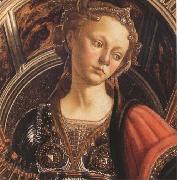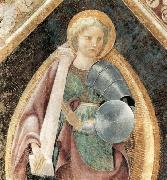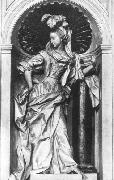Wholesale Oil Painting No Minimum |
|||||||||||
|
|
|||||||||||

|
|||||||||||
|
|
|
||||||||
Sandro BotticelliItalian Early Renaissance Painter, 1445-1510 Italian painter and draughtsman. In his lifetime he was one of the most esteemed painters in Italy, enjoying the patronage of the leading families of Florence, in particular the Medici and their banking clients. He was summoned to take part in the decoration of the Sistine Chapel in Rome, was highly commended by diplomatic agents to Ludovico Sforza in Milan and Isabella d Este in Mantua and also received enthusiastic praise from the famous mathematician Luca Pacioli and the humanist poet Ugolino Verino. By the time of his death, however, Botticelli s reputation was already waning. He was overshadowed first by the advent of what Vasari called the maniera devota, a new style by Perugino, Francesco Francia and the young Raphael, whose new and humanly affective sentiment, infused atmospheric effects and sweet colourism took Italy by storm; he was then eclipsed with the establishment immediately afterwards of the High Renaissance style, which Vasari called the modern manner, in the paintings of Michelangelo and the mature works of Raphael in the Vatican. From that time his name virtually disappeared until the reassessment of his reputation that gathered momentum in the 1890s |
||||||||
|
|
||||||||
Fortitude
Fortitude Painting ID:: 9999 |
c.1470.
Tempera on panel
Galleria degli Uffizi
Florence, Italy c.1470. Tempera on panel Galleria degli Uffizi Florence, Italy |
|||||||
|
|
||||||||
Sandro BotticelliItalian Early Renaissance Painter, 1445-1510 Italian painter and draughtsman. In his lifetime he was one of the most esteemed painters in Italy, enjoying the patronage of the leading families of Florence, in particular the Medici and their banking clients. He was summoned to take part in the decoration of the Sistine Chapel in Rome, was highly commended by diplomatic agents to Ludovico Sforza in Milan and Isabella d Este in Mantua and also received enthusiastic praise from the famous mathematician Luca Pacioli and the humanist poet Ugolino Verino. By the time of his death, however, Botticelli s reputation was already waning. He was overshadowed first by the advent of what Vasari called the maniera devota, a new style by Perugino, Francesco Francia and the young Raphael, whose new and humanly affective sentiment, infused atmospheric effects and sweet colourism took Italy by storm; he was then eclipsed with the establishment immediately afterwards of the High Renaissance style, which Vasari called the modern manner, in the paintings of Michelangelo and the mature works of Raphael in the Vatican. From that time his name virtually disappeared until the reassessment of his reputation that gathered momentum in the 1890s |
||||||||
|
|
||||||||
|
|
Fortitude
Fortitude Painting ID:: 26829 |
1470, detail
Florence,Galleria degli Uffizi. 1470, detail Florence,Galleria degli Uffizi. |
||||||
|
|
||||||||
Sandro BotticelliItalian Early Renaissance Painter, 1445-1510 Italian painter and draughtsman. In his lifetime he was one of the most esteemed painters in Italy, enjoying the patronage of the leading families of Florence, in particular the Medici and their banking clients. He was summoned to take part in the decoration of the Sistine Chapel in Rome, was highly commended by diplomatic agents to Ludovico Sforza in Milan and Isabella d Este in Mantua and also received enthusiastic praise from the famous mathematician Luca Pacioli and the humanist poet Ugolino Verino. By the time of his death, however, Botticelli s reputation was already waning. He was overshadowed first by the advent of what Vasari called the maniera devota, a new style by Perugino, Francesco Francia and the young Raphael, whose new and humanly affective sentiment, infused atmospheric effects and sweet colourism took Italy by storm; he was then eclipsed with the establishment immediately afterwards of the High Renaissance style, which Vasari called the modern manner, in the paintings of Michelangelo and the mature works of Raphael in the Vatican. From that time his name virtually disappeared until the reassessment of his reputation that gathered momentum in the 1890s |
||||||||
|
|
||||||||
|
|
Fortitude
Fortitude Painting ID:: 28976 |
mk65
Tempera on panel
65 3/4x34 1/4in
Uffizi,Gallery
mk65 Tempera on panel 65 3/4x34 1/4in Uffizi,Gallery |
||||||
|
|
||||||||
UCCELLO, PaoloItalian Early Renaissance Painter, 1397-1475 Italian painter, draughtsman, mosaicist and designer of stained glass. His work vividly illustrates the principal issues of Florentine art during the first half of the 15th century. Trained within the tradition of the Late Gothic style, he eventually became a leading exponent of the application of linear perspective based on the mathematical system established by Filippo Brunelleschi and Leon Battista Alberti. It is the merging of these two diametrically opposed tendencies that forms the basis of Uccello's style. As well as painting on panel and in fresco |
||||||||
|
|
||||||||
|
|
Fortitude
Fortitude Painting ID:: 51006 |
c. 1435 Fresco Duomo c. 1435 Fresco Duomo |
||||||
|
|
||||||||
|
|
||||||||
|
|
Fortitude
Fortitude Painting ID:: 63036 |
1685-86 Stucco Ludovisi Chapel, Sant'Ignazio, Rome Rusconi represented Fortitude as female - most abstract qualities are of the feminine gender in Latin. His Fortitude is a rather conventional Minerva-like figure in armour. Artist: RUSCONI, Camillo Painting Title: Fortitude , 1701-1750 Painting Style: Italian , sculpture Type: mythological 1685-86 Stucco Ludovisi Chapel, Sant'Ignazio, Rome Rusconi represented Fortitude as female - most abstract qualities are of the feminine gender in Latin. His Fortitude is a rather conventional Minerva-like figure in armour. Artist: RUSCONI, Camillo Painting Title: Fortitude , 1701-1750 Painting Style: Italian , sculpture Type: mythological |
||||||
|
|
||||||||
|
|
||||||||
|
|
Fortitude
Fortitude Painting ID:: 63037 |
1710-17 White stucco and gilding, height 200 cm Oratorio del Rosario di San Domenico, Palermo Serpotta decorated several oratories with stuccoes in which may be seen all the elements of Rococo style that was to flourish in Germany. He emerged from generations of artisans to become the greatest Sicilian sculptor of his day. He only knew the Baroque indirectly, from prints and contacts with artists who had trained on the mainland, but he achieved a distinctive synthesis of Sicilian and mainland influences, coupled with an extraordinary combination of verve and dexterity. Serpotta represented Fortitude as female - most abstract qualities are of the feminine gender in Latin. His Fortitude was given a column as her attribute. The emphasis is contemporary, from her plumed hat to her high-heeled shoes. Artist: SERPOTTA, Giacomo Painting Title: Fortitude , 1651-1700 Painting Style: Italian , sculpture Type: mythological 1710-17 White stucco and gilding, height 200 cm Oratorio del Rosario di San Domenico, Palermo Serpotta decorated several oratories with stuccoes in which may be seen all the elements of Rococo style that was to flourish in Germany. He emerged from generations of artisans to become the greatest Sicilian sculptor of his day. He only knew the Baroque indirectly, from prints and contacts with artists who had trained on the mainland, but he achieved a distinctive synthesis of Sicilian and mainland influences, coupled with an extraordinary combination of verve and dexterity. Serpotta represented Fortitude as female - most abstract qualities are of the feminine gender in Latin. His Fortitude was given a column as her attribute. The emphasis is contemporary, from her plumed hat to her high-heeled shoes. Artist: SERPOTTA, Giacomo Painting Title: Fortitude , 1651-1700 Painting Style: Italian , sculpture Type: mythological |
||||||
|
|
||||||||
Sir Joshua ReynoldsBritish 1723-1792 Sir Joshua Reynolds Locations Reynolds was born in Plympton, Devon, on 16 July 1723. As one of eleven children, and the son of the village school-master, Reynolds was restricted to a formal education provided by his father. He exhibited a natural curiosity and, as a boy, came under the influence of Zachariah Mudge, whose Platonistic philosophy stayed with him all his life. Showing an early interest in art, Reynolds was apprenticed in 1740 to the fashionable portrait painter Thomas Hudson, with whom he remained until 1743. From 1749 to 1752, he spent over two years in Italy, where he studied the Old Masters and acquired a taste for the "Grand Style". Unfortunately, whilst in Rome, Reynolds suffered a severe cold which left him partially deaf and, as a result, he began to carry a small ear trumpet with which he is often pictured. From 1753 until the end of his life he lived in London, his talents gaining recognition soon after his arrival in France. Reynolds worked long hours in his studio, rarely taking a holiday. He was both gregarious and keenly intellectual, with a great number of friends from London's intelligentsia, numbered amongst whom were Dr Samuel Johnson, Oliver Goldsmith, Edmund Burke, Giuseppe Baretti, Henry Thrale, David Garrick and fellow artist Angelica Kauffmann. Because of his popularity as a portrait painter, Reynolds enjoyed constant interaction with the wealthy and famous men and women of the day, and it was he who first brought together the famous figures of "The" Club. With his rival Thomas Gainsborough, Reynolds was the dominant English portraitist of 'the Age of Johnson'. It is said that in his long life he painted as many as three thousand portraits. In 1789 he lost the sight of his left eye, which finally forced him into retirement. In 1791 James Boswell dedicated his Life of Samuel Johnson to Reynolds. Reynolds died on 23 February 1792 in his house in Leicester Fields, London. He is buried in St. Paul's Cathedral. |
||||||||
|
|
||||||||
|
|
fortitude
fortitude Painting ID:: 69383 |
se se |
||||||
|
|
||||||||
|
Sir Joshua Reynolds British 1723-1792 Sir Joshua Reynolds Locations Reynolds was born in Plympton, Devon, on 16 July 1723. As one of eleven children, and the son of the village school-master, Reynolds was restricted to a formal education provided by his father. He exhibited a natural curiosity and, as a boy, came under the influence of Zachariah Mudge, whose Platonistic philosophy stayed with him all his life. Showing an early interest in art, Reynolds was apprenticed in 1740 to the fashionable portrait painter Thomas Hudson, with whom he remained until 1743. From 1749 to 1752, he spent over two years in Italy, where he studied the Old Masters and acquired a taste for the "Grand Style". Unfortunately, whilst in Rome, Reynolds suffered a severe cold which left him partially deaf and, as a result, he began to carry a small ear trumpet with which he is often pictured. From 1753 until the end of his life he lived in London, his talents gaining recognition soon after his arrival in France. Reynolds worked long hours in his studio, rarely taking a holiday. He was both gregarious and keenly intellectual, with a great number of friends from London's intelligentsia, numbered amongst whom were Dr Samuel Johnson, Oliver Goldsmith, Edmund Burke, Giuseppe Baretti, Henry Thrale, David Garrick and fellow artist Angelica Kauffmann. Because of his popularity as a portrait painter, Reynolds enjoyed constant interaction with the wealthy and famous men and women of the day, and it was he who first brought together the famous figures of "The" Club. With his rival Thomas Gainsborough, Reynolds was the dominant English portraitist of 'the Age of Johnson'. It is said that in his long life he painted as many as three thousand portraits. In 1789 he lost the sight of his left eye, which finally forced him into retirement. In 1791 James Boswell dedicated his Life of Samuel Johnson to Reynolds. Reynolds died on 23 February 1792 in his house in Leicester Fields, London. He is buried in St. Paul's Cathedral. fortitude se |
||||||||
|
|
||||||||
|
Prev Next
|
||||||||
|
|
||||||||
|
Related Paintings to Sir Joshua Reynolds :. |
||||||||
|
|
||||||||
|
CONTACT US |







